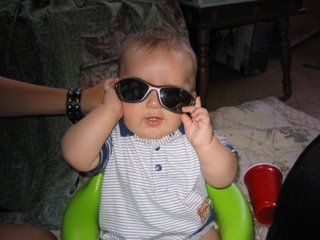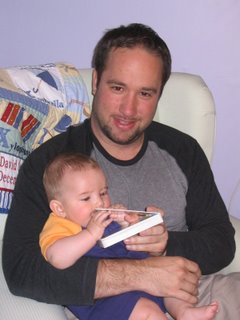My Weekend in Kurdistan, Conclusion
After breakfast we piled back into the Land Cruisers for a twenty minute drive through the Kurdish countryside, where we were dropped off in a clearing halfway up a mountainside. Masoud Barzani, his sons, and Ambassador Khalilzad led the group down a narrow trail that curled around the ridge, setting such a brisk pace that they quickly separated themselves from the entourage in tow. One of the Pesh Merga scrambling to keep up with them to provide security nearly fell of the side of the mountain! Personally, I had to move so quickly over the rocky ground that was not able to take in as much of the scenery as I would have liked.
We hiked for about an hour down the mountain side to a stream with a swift current, green water shimmering in the morning sun, and a steep, rocky slope on the opposite shore. We stopped at a rock outcropping below a sharp bend in the river. Already waiting for us was a cooler filled with water and soda, as well as watermelon and some vegetable cooling in a spring that emerged from the base of the mountain. The Kurds immediately started to set up a grill and a tent amongst the rocks. Fresh chickens were brought in by jet ski, and various attendants started chopping vegetables and skewering the chicken. And, of course, hot tea was brought to us as soon we arrived.
Although the water up in the mountains was freezing (around 50 degrees), Barzani, his sons, and the Ambassador didn't hesitate to put on life preservers, wade out into the middle of the stream, and proceed to float down the river. Although I never made it out past my thighs, the other Kurds also played joyfully in the water despite the temperature. I guess that having survived genocide, persecution, and exile, a little cold water can't stand in the way of enjoying the good life.
While waiting for lunch, I was given a ride on a two person jet ski with one of the KDP officials. Given that I was likely the first American military officer to visit Barzani's retreat, and that these jet skis are as close as the Kurds come to having a navy, this was likely the first joint U.S.-Kurdish naval maneuvers in history! We traveled about 2-3 miles up and downstream from camp, passing some spectacular rock formations and caves, an ancient stone bridge that had either been washed away or destroyed so all that remain are the rock piles on either side of the stream, and an assortment of locals fishing or bathing, including a car that was inexplicably parked in the stream itself.
We ate lunch atop a green artificial turf mat laid out over the rocks beneath a blue and white striped beach tent. A plastic mat sat in the middle of the tent, with ten place settings, and was covered with plates of lamb and chicken kabobs, assorted vegetables, rice with lamb, and lamb still on the bone. I commented on how beautiful the mountains were here, and one of the Barzanis relayed the legend of how the Babylonian King married a Kurdish bride, and to keep her from feeling homesick, built the Hanging Gardens of Babylon to remind her of Kurdistan.
Tea was served after the meal (of course), accompanied by bowls of fruit.
As the afternoon wore on, sadly it was time to go. We were expected at Nechrivan Barzani's (Prime Minister of the Kurdish Regional Government) house in Irbil for dinner. However, there was no plan for how to get everybody back to the SUVs parked downstream other than to take the river rather than hike. So what ended up happening was like a scene out of the Peanuts River Race: the President of Kurdistan and his sons were floating down the river in life preservers, accompanied by the Ambassador of the United States of America to Iraq in an inner tube; the former Prime Minister of Iraq was put into a two person jet ski whose engine died halfway down the river; the American security detail followed in a rubber raft that consistently took on water throughout the trip; and circling them all the whole time were various Pesh Merga and KDP security officials on jetskis.
I managed to hitch a ride with the President's nephew, who brought his personal $10,000 racing jet ski for the occasion. We ended up passing everybody else, and I found myself being the first American to arrive at the sandy landing point where the SUVs were waiting for us. The Barzani's nephew dropped me off in the middle of several Kurdish families on the beach, to whom a foreigner getting off the back of a Barzani's jet ski must have looked like something out of a James Bond movie (if only I were wearing a tuxedo!)
The sand burned my feet, so I stopped halfway up the shore to put my hiking boots back on. An eleven-year old boy ran up to where I was sitting and said, "I love you!"
I did something of a double-take and smiled awkwardly, so the boy spoke again.
"I love you, America!"
Okay, that made more sense! I laughed, and the boy said with even greater enthusiasm than before:
"I LOVE YOU, GEORGE BUSH!!!"
I thanked him on behalf of the President, and pulled out my Kurdish-English phrase book. Immediately I was surrounded by a half-dozen Kurdish boys (ages 8-15), with whom I tried every phrase or question that seemed remotely applicable. Unfortunately, the phrase book was a gift from somebody on President Talibani's staff, and I'd forgotten that Arbil Province (Barzani's base) and Sulamaniyeh Province (Talabani's base) employ different dialects of Kurdish. So for twenty minutes the boys and I made an extremely awkward, if good-hearted, attempt to communicate. Eventually, the rest of the river race caught up, and I had to say Zors Spas to my new friends.
In the end, my weekend in Kurdistan is likely to be the best three days of my tour in Iraq. The scenery was gorgeous, still untouched by the economic development that is quickly coming to Northern Iraq. The Barzanis were extremely gracious and generous hosts -- although there are definitely critics of their oligarchy, the lives of the Kurdish people are definitely improving under their leadership, and they represent an improvement of epic proportions over what the Kurds endured under Saddam Hussein and previous regimes in Baghdad. And finally, the Kurdish people I met were exceedingly friendly despite their years of suffering and previous indifference and betrayals by American administrations (i.e. Kissinger in 1975; the Reagan Administration's lack of response to Anfal).
I seriously hope that I am able to return to Kurdistan someday, and hopefully will be able to bring my family as well.










